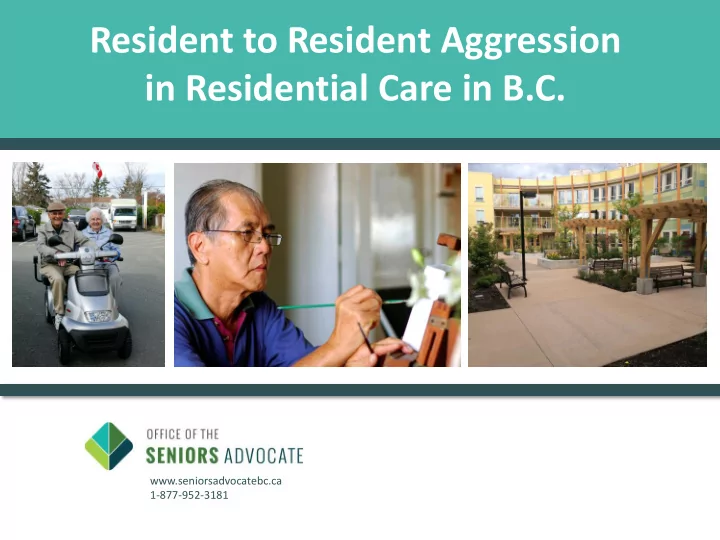

Resident to Resident Aggression in Residential Care in B.C. www.seniorsadvocatebc.ca 1-877-952-3181
Background Increased public awareness of resident to resident aggression (RRA) incidents for seniors in care In 2013, regulations were changed to enable capture of these types of incidents This is the first systemic review of incidents looking for patterns or predictors 1
Objectives of Review To examine incidents of aggression between residents that resulted in harm to one or both of the residents To look at the facilities where incidents are occurring, as well as the circumstances of the incidents themselves To identify where, or if, specific systemic patterns emerge when looking at incidents 2
Challenges in Conducting the Review Residential care governed by 2 separate regulatory frameworks – Hospital Act (HA) and Community Care and Assisted Living Act (CCALA) 204 facilities under CCALA, 100 under HA (includes both owned and operated and private) CCALA sites report their incidents to Licensing Office and it is mandatory Hospital Act sites report through different streams depending on Health Authority, including the Patient Safety and Learning System 3
Definitions Differ Under CCALA: Aggression between persons in care that results in injury requiring first aid, emergency treatment, or hospitalization Under Hospital Act: Serious adverse event that l eads to severe harm or the death of a resident Severe harm is an injury that: Causes permanent or long- term changes to a person’s quality of life and functioning Causes pain, requires major medical intervention, or leads to a shortened life expectancy Under PSLS: Incidents resulting in minor, moderate, or severe harm; or death 4
Incidents Examined RRA incidents between April 1, 2014 and March 31, 2015 Analysis of incidents by facility characteristics • 331 reported incidents (excluding PSLS incidents) • 58% of facilities reported no incidents Analysis of individual incident reports • 422 incidents including PSLS incidents • Anonymized data – not tied to individual facilities 5
Characteristics of People in Care Less than 4% of BC seniors live in residential care 4% over 65 / 15% over 85 Seniors in Residential Care Over 85 years of age 56% Female 65% Diagnosis of Alzheimer's or other dementia 61% Diagnosis of psychiatric condition or mood disorder 30% Moderate to severe cognitive/memory impairment 62% Combination of complex conditions indicating high 82% or very high need for facility level care Exhibits aggressive behaviour 33% Received 9 or more different medications in the 51% last 7 days Source: CIHI RAI MDS-2.0 Assessment 6
Facility-level Findings 331 incidents Facilities with • More psychiatric diagnoses and more reports of RRA diagnosed aggression problems incidents • Higher instances of physical and verbal abuse tended to • Higher rates of anti-psychotic use have resident • Higher mobility populations • Higher rates of independent walking with: 7
Individual Incidents – Time of Day 422 incidents 45% 39% 40% 35% Percent of Incidents 30% 26% 25% 19% 20% 15% 9% 10% 5% 5% 2% 0% 0:00-4:00 4:00-8:00 8:00-12:00 12:00-16:00 16:00-20:00 20:00-0:00 Time of Day 8
Facility-level Findings Incidents and Direct Care Hours • Facilities with incidents tended to have residents with more complex care needs while having slightly fewer direct care hours (3.08) than those with no incidents (3.13) • While this is equivalent to only three minutes per resident per day, in an 80 bed facility, this represents a deficit of four hours of direct care (182 fewer eight hour shifts per year) • May suggest that facilities where residents have more complex care needs (and more incidents) are not getting enough care hours to adequately handle the complexity of their residents 9
Location of Incidents 40% 35% 35% 31% 30% Percent of Incidents 25% 20% 18% 15% 12% 10% 5% 2% 1% 1% 0% Resident's Dining area Hallway Lounge area Outdoors Other Off premises room shared area Incident Location 10
Characteristics of Aggressors Gender and Age Range 60 56 50 40 Count of Aggressors 39 40 33 30 Male Female 21 20 10 5 0 65-74 75-84 85+ Age Range 11
Characteristics of Victims Gender and Age Range 60 55 50 40 Count of Victims 34 30 Male Female 20 17 13 11 10 6 0 65-74 75-84 85+ Age Range 12
Mitigation Strategies The majority of • Secure units and alarm systems facilities have • Technology to monitor resident put in place movements strategies to • Secured indoor/outdoor walking reduce circuits aggressive • Low stimulant rooms behaviours and • P.I.E.C.E.S Training (for dementia) wandering 13
Recommendations from Study The OSA recommends the implementation of: A consistent definition of RRA incidents across Health Authorities Province-wide processes to track both RRA incidents and their follow up A review of the adequacy of staffing for residents with more complex needs, specifically during busy times like dinner hours Ministry of Health called for a review of care hours in April 2016 More education for staff and management to ensure that staff report and address RRA incidents comprehensively Facility design features that are known to be effective in mitigating aggressive behaviours including the use of locking systems for private rooms to mitigate wandering behaviours 14
Thanks and Acknowledgement Special thanks to: Health Authorities PSLS Team Residential care facilities that took the time to respond to our survey Ministry of Health staff 15
Questions? Questions and suggestions on further analysis are welcome 16
Contact www.seniorsadvocatebc.ca Toll-free: 1-877-952-3181 In Victoria: 250-952-3181 Open Monday to Friday, 8:30am - 4:30pm Translation services available in more than 180 languages. info@seniorsadvocatebc.ca facebook.com/SeniorsAdvocateBC @SrsAdvocateBC 17
Recommend
More recommend